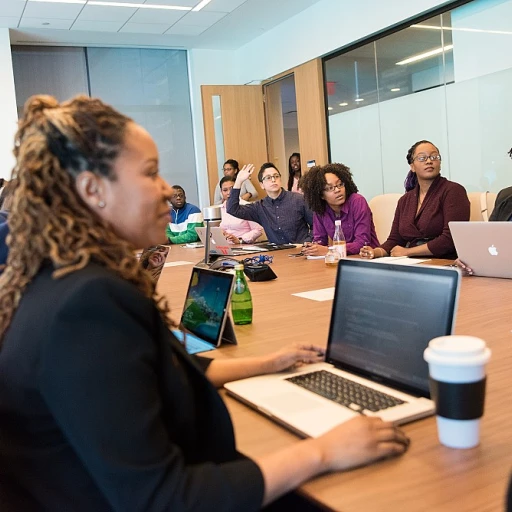
The Role of Appreciation in Employee Retention
The Power of Valued Employees
Appreciation serves as a fundamental pillar in retaining employees by fostering a positive work environment where individuals feel valued and motivated. Recognizing the hard work and dedication of team members cultivates a sense of belonging, integral to employee engagement. When appreciation becomes a natural part of the workplace culture, employees feel appreciated for their contributions, fueling a positive attitude. This in turn, enhances team success and can result in a reduced turnover rate, saving the company time and resources. The importance of coworker appreciation cannot be understated; from simple appreciation messages to meaningful appreciation gifts, these gestures create a ripple effect that impacts the entire organization. Incorporating employee recognition into daily life at work ensures that coworkers and colleagues are acknowledged for their hard work. Gastronomy Manager mentions that "appreciation quotes" or "appreciation messages" can bridge the gap between the management and employees." Read more on how employee appreciation day cards can boost retention here.Practical Ways to Show Appreciation
Ways to Implement Appreciation in the Workplace
Showing appreciation in the workplace is not just about saying "thank you" but fostering a culture where every employee feels valued and recognized. While spontaneous acts of gratitude matter, creating structured appreciation practices can make a significant difference. Here are practical ways to express gratitude and enhance your team's work environment:
- Personalized Messages: Taking the time to write personalized appreciation messages can have a heartfelt impact on employees. Recognize specific instances of hard work and dedication, and highlight how their efforts contribute to team success. Such messages help colleagues feel appreciated and valued.
- Public Recognition: Celebrating achievements in team meetings or through internal newsletters can positively impact your workplace culture. Acknowledging an employee's hard work in front of their peers strengthens their sense of belonging and promotes a positive attitude across the team.
- Appreciation Gifts: Sometimes, a tangible token of appreciation can speak volumes. Opt for thoughtful gifts that reflect the recipient’s interests or contributions to the company. This gesture goes a long way in showing employees that their efforts are recognized and valued.
- Dedication Days: Implementing a "Colleague Appreciation Day" or similar events can formalize gratitude, ensuring that acknowledgment becomes a regular part of the work culture. For more insights, explore how celebrating office managers contributes to this culture on Office Manager Appreciation Day.
- Feedback and Growth: Regularly soliciting feedback and providing opportunities for employees to grow within the company shows appreciation for their potential and work dedication. It helps them feel valued and engaged.
By incorporating these practices, businesses can foster a positive work culture where employees feel appreciated and motivated. These actions not only benefit the individual but can lead to a ripple effect of gratitude throughout the company.
The Ripple Effect of Gratitude in the Workplace
The Ripple Effect of Positive Recognition Practices
When appreciation is genuinely integrated into the company culture, the impact extends far beyond individual moments of gratitude. It creates a positive workplace culture where employees naturally feel valued for their hard work and dedication, fostering a profound sense of belonging. This ripple effect can significantly enhance overall team success and employee engagement.
A work environment that consistently recognizes and appreciates contributions encourages employees to maintain a positive attitude. Here, appreciation messages and recognition practices not only celebrate successes but also motivate team members to keep striving towards excellence. As a result, the entire team begins to produce great work consistently, driven by the knowledge that their efforts will be positively acknowledged.
Moreover, a consistent appreciation effort cultivates strong coworker relationships. Positive relationships among colleagues can lead to a more cohesive team, where everyone shares the burden and success of the work. The best practices in employee appreciation can, therefore, lead to a collective work dedication that propels the company forward. Implementing thoughtful and strategic appreciation programs shows employees that their contributions are not just seen but valued, ultimately leading to higher retention rates as employees feel appreciated and respected.
For medium-sized enterprises seeking to implement the best HR solutions, integrating recognition practices is essential. To explore more about this, be sure to check out our insights on the best HR solutions.
Challenges in Expressing Appreciation
Overcoming Hurdles in Showing Gratitude
In any work environment, expressing gratitude can sometimes feel challenging. Navigating these hurdles effectively requires understanding the workplace culture and fostering a positive attitude among employees and team leaders alike. Firstly, one significant challenge is the fear of insincerity. When messages of appreciation are perceived as forced or lacking sincerity, they can lead to skepticism among coworkers. Employees might feel that recognition is merely a strategic move to improve productivity, rather than a genuine expression of gratitude. Overcoming this requires consistency and authenticity in appreciation messages, ensuring that employees feel valued for their hard work and dedication. Another common challenge is balancing acknowledgment without favoritism. It's essential to ensure that all colleagues receive recognition for their contributions, rather than just the top performers. This creates a sense of belonging among the team and reinforces that every employee's efforts contribute to team success. Limited resources can also impede the frequency of appreciation rituals. While appreciation gifts and formal recognition ceremonies can be expensive, it's vital to remember that simple expressions of gratitude, such as appreciation quotes or verbal commendations, can also significantly impact employee engagement and feelings of being appreciated. Communication barriers can additionally pose an obstacle. Employers and team leaders need to develop effective channels for communicating recognition, tailoring messages to suit different cultural and personal preferences within the company. This ensures all employees feel the positive impact of recognition in their work life. By addressing these challenges, organizations can cultivate a great workplace culture where appreciation is seamlessly integrated, allowing employees and the company to thrive together.Measuring the Impact of Appreciation on Retention
Quantifying the Value of Gratitude in the Workplace
Understanding the actual impact of appreciation on employee retention can be quite complex. However, measuring its effects is crucial to optimize strategies in a work environment. Numerous studies indicate that when employees feel appreciated, there is a noticeable improvement in their job satisfaction and overall engagement. This positive attitude often translates into a reduced turnover rate, as employees are more likely to remain loyal to a company where they feel valued.
To effectively measure the impact of appreciation, companies can employ various metrics and survey tools:
- Employee Feedback Surveys: These can gauge how employees perceive the company culture and if they feel recognized for their work dedication. Feedback can be a great source of valuable insights to identify areas of improvement.
- Retention Rates: Monitoring who stays and who leaves can offer data-driven insights into how appreciation initiatives influence employees' decisions to remain with the company.
- Performance Reviews: Correlating employee performance with recognition received can reveal trends in how appreciation impacts both individual and team success.
Furthermore, assessing the effectiveness of specific appreciation messages or appreciation gifts offered can provide clarity on what works best. Employee appreciation initiatives should foster a sense of belonging and emphasize the hard work and dedication of employees. When coworkers express gratitude genuinely, it builds a positive work culture and enhances employee engagement.
Although challenges exist in expressing appreciation, as previously discussed, quantifiable methods to measure its impact can lead to more successful appreciation programs. Recognizing the best initiatives allows companies to repeat and refine effective strategies, ensuring that employee appreciation remains a top priority.












